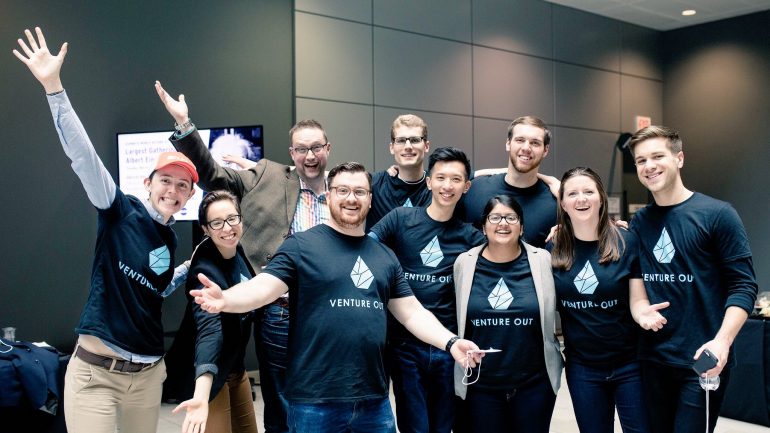In the tech world, there seems to be a conference for everyone; whether you’re interested in FinTech, health, marketing — really any vertical — there will be a gathering for you.
But in an industry that is largely dominated by straight white men, there aren’t many conferences that address the issue of being a marginalized person entering a new workplace. On Monday, Start Proud sought to change that with Canada’s first-ever LGBTQ+ tech conference. The conference was targeted to students who were thinking about entering the tech industry, but are unsure about navigating coming out in the office.
CEO panels and a keynote from Fundserv director of product innovation and marketing Lina Ismail provided the perspectives of business leaders on building diverse teams.
“You can’t measure everything. And you’ve got the quality of benefits and not just the quantity,” Ismail said when asked about the ‘human’ case for diversity, rather than just the business benefits.
What will surely be a power panel: How can scale-ups focus on diversity and inclusion as they grow? #VentureOut #CDNtech???????? pic.twitter.com/enB0Fo09sZ
— Cassie Ruggiero (@cassruggiero) March 27, 2017
“You can say you’ve hired people who look different, who come from different backgrounds, but if you can’t have people collaborating openly in an uninhibited way, you’re not seeing the benefits you can from your employees. It’s the relationship between the fact that you’re building positive change on a human level, and not just for business benefits.”
During one of the many conversations throughout the day, the speakers tackled startup issues like hiring in a fast-growing company, and implementing policies of diversity.
“When you have three devs and one woman, it’s probably going to be easier to hire one more woman,” said Eva Wong, COO of Borrowell. “But if you have eight devs and one women, it’s harder. Because what woman wants to a join a team that is male-dominated? For us, it’s a conversation we have all the time.”
“If you are in a position where you want to reveal something personal about yourself, it’s very telling how people react.”
But even once if you make a point to hire diverse teams, it can be difficult to create an environment where employees feel free to be themselves. Lydia Sarkovski, senior solution engineer at Salesforce, described an instance where creating an inclusive environment could become a measurable process. The result ended up turning into Outforce, an internal community for LGBTQ+ Salesforce employees and allies.
“Outforce was started by an inside sales rep scouting people who said, ‘I don’t know… I don’t see people like me right now, so I don’t want to step up,” said Sarkovski. But one day, an employee reached out to their manager and said they had a hard time with productivity due to fear of coming out to their family and colleagues.
“His sales leader said, ‘Let’s create a metric for you to come out to one person of every week.’That’s how it started, and this employee felt comfortable and has been promoted five times [since].”
Great pitch from #Liiv at #VentureOut Check out Alan Turing's story as a poignant reminder of how important empathy/support with #lgbtq is. pic.twitter.com/3FWR9i0GEg
— Chris McKillop (@atscmc) March 27, 2017
For people who might be scared that they’re entering a workplace that might not be accepting, Larissa Holmes, an HR and operations professional, says you can trust your instincts.
“There are some times to be yourself, and there are also times where it’s not always appropriate generally to talk about the personal side of things,” Holmes said. “But if you are in a position where you want to reveal something personal about yourself, it’s very telling how people react. You don’t want to work somewhere where it’s not a positive response. Even if you feel hostility, that’s telling of the company, and you don’t want to be there. It will only get worse.”
To get a feel for a company’s culture, Holmes suggested checking if a company participates in events like VentureOut, and even asking the hiring manager to speak to a peer about their day-to-day activities.
While diversity in tech is a major topic of discussion, there are, of course, people that don’t care about it or see its value. Avery Francis, head of talent at Rangle.io, says she doesn’t spend too much time trying to convince people of its value if they don’t want to see it. Instead, she focuses more on showing its value in real-world situations.
“We focus on delivering on initiatives, and we celebrate those wins. When we shifted away from trying to get everyone on board, what we found is that…people started to see the good things we did and the impact it was making.”
Francis described how Rangle’s BRIDGE program, a free code school for women working in JavaScript in Toronto, showed impact for both the company and the tech ecosystem.
“Myself and my CTO Yuri were like, we need to hire senior-level developers who are women, and we can either take, or we can actually contribute and get way more women in this field. So we decided, let’s level them up,” said Francis. “We had 200 applicants in a week. And a lot of the stories were, I’ve always wanted to work at Rangle and it’s my dream job, but I was scared to apply. And when we tested them, they all turned out to be solid, and some of them surpassed the program and we said, we just want to hire you.”
Photo via Twitter

